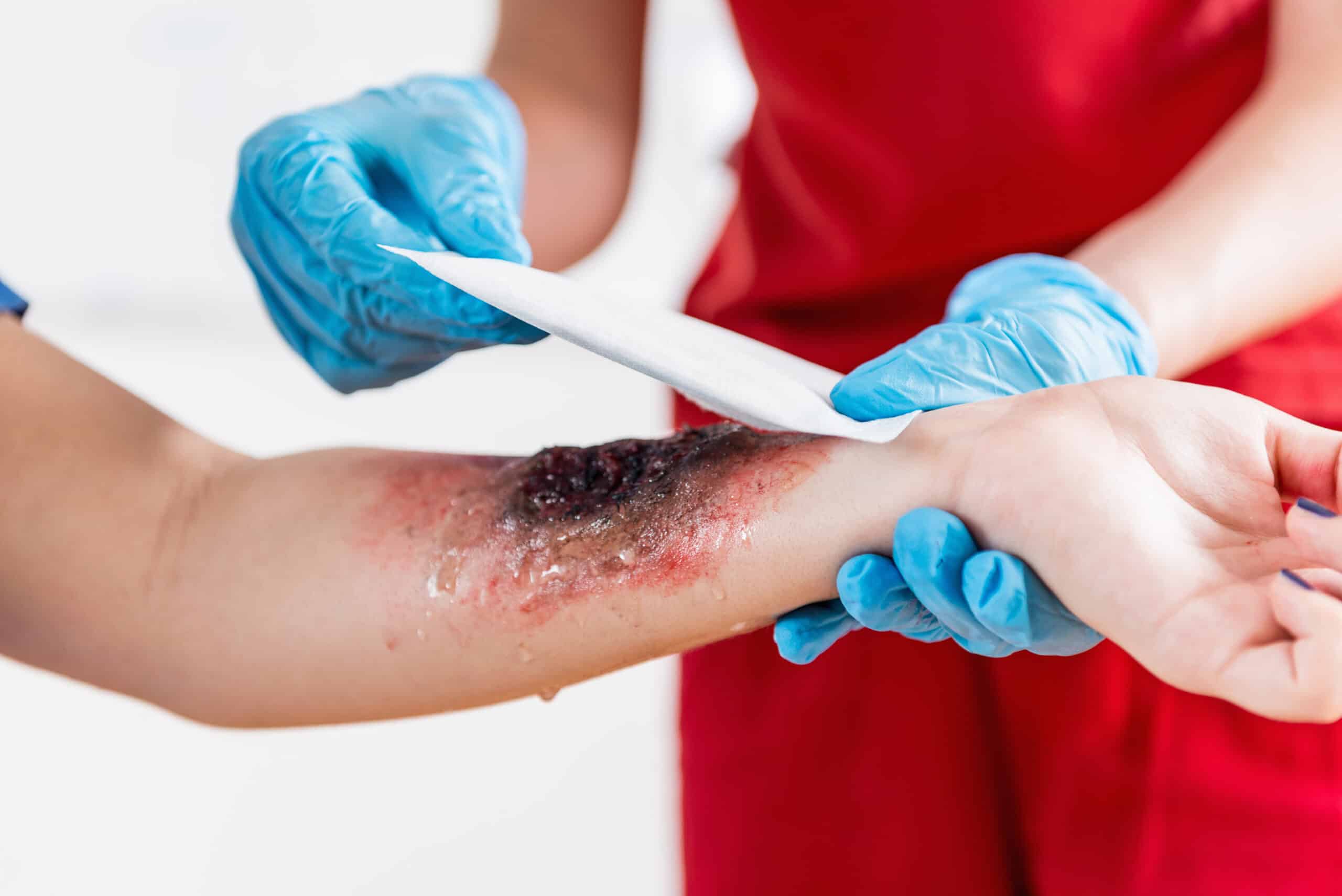
Workplace Burn Injuries in Georgia: Can You Sue Your Employer?
Thousands of burn injuries occur at workplaces every year, and they can happen in any industry. Although first-degree burns may only cause a few days’ pain and irritation, second-degree burns require more recovery and sometimes even skin grafts. Third-degree burns, which destroy skin tissue and nerves, can cause permanent disfigurement and long-term disability.
Most Common Types of Workplace Burn Injuries that Occur Across Georgia
Workplace injuries usually involve four major types of burns:
- thermal, resulting from heat or flames
- chemical, caused by substances
- radiation, caused by UV light (including the sun) or radioactive materials
- electrical, resulting from an electric current
Food service, of course, carries the risk of thermal burns—spills of scalding liquid, burns from heated elements. Construction involves the risk of electrical burns or fires in fresh wood and sawdust. Any profession that uses caustic liquids, such as professional cleaning or cosmetology, exposes workers to possible chemical burns. And even desk workers can be involved in an accidental office fire. Friction and frostbite injuries may also be classified as burns, with similar treatment profiles.
After suffering burns, what can workers do to protect themselves and their future?
- All insurance claims set up
- Police Report
- Pictures
- Quesetionnaire / Documentation
- Chiropractic
- Physical Therapy
- Orthopedicts
- MRI
- Neurological
- Other Specialists
- Collect all medical records
- Request compnesation for pain, suffering, lost wages, medical bills, damages, and other bills related to your case
- Receive offers from Insurance Companies
- Negotiate with Insurance Company representativ
- Sign Release(s)
- Receive Check(s)
- Verify balances of medical bills (if medicare or medicaid, ~90 Days)
- Reduce medical bills
- Draft and sign disbursement
Recovering from Workplace Injuries in Georgia
Almost every state, including Georgia, has workers’ compensation laws that require most employers to carry no-fault insurance for their employees. “Workman’s comp” is intended to make life easier for both bosses and workers. In theory, the worker should get the money and time they need to recover without time-consuming investigation, while the employer’s insurance company handles the claim with no need to interrupt business for a lawsuit.
However, things do not always go so smoothly. Under workers’ compensation law, covered workers have no right to sue their employers over personal injuries on the job—they are required to seek compensation through their employer’s insurance. Unfortunately, employers often hate to make claims on their policy and may evade their responsibilities.
When to Sue an Employer or a Third Party for Workplace Burn Injuries in Georgia
In a few situations, an injured worker can file a lawsuit against their employer or a third party involved in the injury. These include:
Still, in a few situations, an injured worker can file a lawsuit against their employer or a third party involved in the injury. These include:
Where There Is No Workers’ Compensation Coverage
If an employer has fewer than three employees, they are not required to carry workers’ compensation insurance. The law also makes an exception for certain workers, including farm laborers and “domestic servants” such as cleaners and babysitters, although employers can choose to cover them. Independent contractors are not covered under this law.
If the employer was legally required to carry insurance and did not, they owe the employee compensation just as if they had done so. Furthermore, the employee may eventually recover extra compensation as a civil penalty to the employer. Where the employer did not need to carry workers’ compensation insurance, there is nothing to prevent a worker from suing them directly. But as with any lawsuit, the injured worker must show grounds for their claim.
Where the Employer’s Negligence Caused the Injury
An employer is required to use reasonable care to provide safe tools and workspaces, as well as in hiring other personnel. Where they know or should know that the job is not safe, they have a duty to warn. If a worker is injured due to the employer’s failure to ensure a safe workplace or to warn, they may have a right to file suit against the employer. However, the employee must show that they “did not know and had not equal means of knowing” about the danger that caused the accident. See O.C.G.A. § 34-7-23.
Where a Third Party Caused the Injury
If someone from outside the company caused an employee’s injury, the employee is covered by workers’ compensation, but they also have the right to make a claim against the third party that injured them. For example, a worker injured in a traffic accident while on the clock can also make a claim against the driver who hit them. When a defective product—a tool, an appliance, or a material—injures a worker who was using it in the course of the job, the worker has a right to sue the manufacturer. In both situations, the worker retains the right to workers’ compensation from their employer.
However, when a third party is liable for the injury, the employer—or rather, the employer’s insurance company—has the right to recover the money they paid out in workers’ compensation benefits. They can assert this right in court by suing the third party themselves, or else by making a claim on the damages that the worker wins in their own lawsuit.
What Damages Can You Recover from an Employer or a Third Party If You Sue for a Workplace Burn Injury in Georgia?
While most workplace injuries fall under Georgia’s workers’ compensation system, there are situations where an injured employee may have the right to pursue a personal injury lawsuit. This is especially true if your case involves severe burn injuries, mainly when a third party—such as a contractor, manufacturer, or property owner—was accountable for the unsafe conditions that caused your accident. In rare but serious cases, employees may also sue their employer directly if gross negligence or intentional misconduct is involved.
If you are eligible to file a lawsuit instead of—or in addition to—seeking workers’ comp benefits, the range of compensation available to you is significantly broader. Unlike workers’ comp, which limits recovery to medical treatment and partial wage replacement, a personal injury or catastrophic injury claim allows you to pursue full compensation for:
- Medical bills (including surgeries, skin grafts, hospital stays, and rehabilitation)
- Future medical care and assistive devices
- Lost wages and diminished future earning capacity
- Pain and suffering, both physical and emotional
- Disfigurement and permanent scarring
- Emotional distress, including PTSD or trauma from the injury
- Loss of enjoyment of life if the injury impacts daily functioning or independence
In catastrophic cases—such as burns that cover a large portion of the body, result in amputations, or cause permanent nerve damage—the damages can be extensive and life-changing. That’s why it’s crucial to explore every legal option beyond workers’ comp when third-party liability or gross employer negligence is involved.
Why You Need a Georgian Catastrophic Injury Lawyer for Serious Workplace Burns
Severe burn injuries are often classified as catastrophic under Georgia law, especially when they result in long-term disability, disfigurement, or the need for ongoing medical treatment. These injuries are not only physically and emotionally devastating—they also present complex legal challenges when it comes to holding the right party accountable and securing full compensation.
That’s where a catastrophic injury lawyer comes in. Unlike general personal injury cases, catastrophic injury claims involve high stakes, aggressive insurance defense teams, and a deep understanding of both medical and legal issues. A skilled attorney can investigate whether a third party, defective product, or grossly negligent employer contributed to your injury—and build a case that reflects the true extent of your losses.
Here’s what an experienced Georgia catastrophic injury attorney can do for you:
- Identify all liable parties, including those outside your employer
- Preserve critical evidence before it disappears or is destroyed
- Consult with burn specialists and medical experts to document long-term needs
- Calculate your damages with a future-focused lens, including loss of quality of life
- Negotiate from a position of strength—or take your case to trial when necessary
If your injury was caused by something more than just a workplace accident—such as unsafe machinery, a subcontractor’s carelessness, or a dangerous chemical product—a catastrophic injury attorney can help you pursue the justice and compensation workers’ comp alone won’t provide.
What Are the Next Steps as a Workplace Burn Injury Victim in Georgia?
Act quickly—you will need to report your accident within 30 days of the injury. But you don’t have to face this process alone. A workers’ compensation attorney knows how to help you get what you need as soon as possible. They can also represent you in hearings, if necessary, defending you from your employer’s counsel and relieving you of pressure at a difficult time.
At The Scott Pryor Law Group, we can also help determine whether you can file a lawsuit against your employer or another party who was responsible for your injury. If you are entitled to damages because of negligence or defective materials you worked with, we want to help you claim your rights. And if you file a lawsuit with us, you won’t have to pay us for it unless you win.
To schedule a free consultation in our Gwinnett County offices, call us today at (404) 474-7122.










